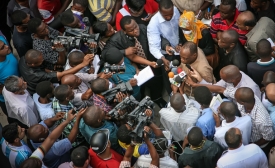propaganda
Israel needs a new information agency to improve its pathetically inadequate public diplomacy efforts, insists Dr. Norman Bailey. [...] Right now, however, it is badly losing a war fought with words, not bullets, but the effect of which can be just as devastating for Israel’s future.
Differing with Under Secretary Stengel’s more optimistic assessment, two senior Google executives said that ISIS’ voice is “a lot larger” and “a lot louder” on the Internet than the voice of its opponents in the U.S. and elsewhere.
Benjamin Franklin wrote and published this hoax "Supplement to the Boston Independent Chronicle" in 1782, hoping that it would end up in the hands of British newspaper editors, who might reprint articles from its pages. Through these manufactured tales of atrocities perpetrated by Native Americans at the behest of the British, Franklin looked to influence the mindset of the British public as he worked on negotiating the peace treaty that would formally end the conflict between Britain and the new United States.
A few days ago, the New York Times reported on a leaked memo written by Richard Stengel, the State Department's under secretary for public diplomacy, who criticized America's foreign partners in the effort to counter the Islamic State's propaganda. It's the latest chapter in the U.S. government's decade-long saga to counter jihadist propaganda, which Greg Miller and Scott Higham documented so thoroughly last month in the Washington Post.
Vintage motorcycles, Abraham Lincoln, baseball, the paintings of Nikolai Getman, and treasures from the Walt Disney Archives at the Ronald Reagan Presidential Library and Museum were among the exhibition subjects Andrew Wulf staged during his five years as curator at the National Archives. A proudly proclaimed man of many interests, Wulf is the new director of the New Mexico History Museum/Palace of the Governors.
The fall of the ancient Syrian city of Palmyra to the Islamic State this week marked an opportunity for the militant group to push its propaganda forward. [...] The militants’ decision to publicize their victory via social media is typical of the group’s strategy as it strives to use the Internet to push its propaganda forward – and it comes as the Obama administration faces increasing scrutiny of its policies for combating the extremist group on both fronts.

David S. Jackson on the journalism-propaganda conundrum.







